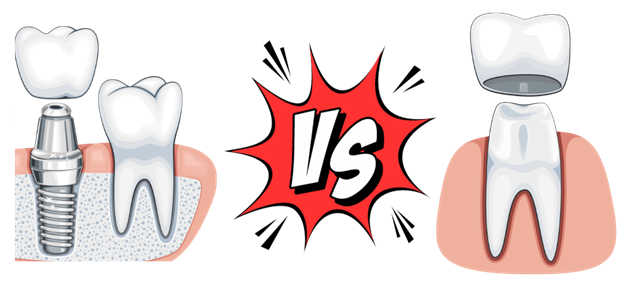If you’re on a journey to restore your smile, you’ve probably come across two popular options: dental implants and dental crowns. But how do you navigate this decision? In this article, we’ll delve deep into the world of dental restoration, demystifying implants and crowns to empower you to make the best choice for your oral health.
Dental Implants: The Foundation of a Beautiful Smile
Think of dental implants as the solid bedrock beneath a magnificent building. These small titanium posts serve as the foundation for your replacement teeth. Here’s a closer look:
1. Permanence and Durability
One of the standout features of dental implants is their permanence. Once placed, they become a permanent part of your mouth. They’re incredibly durable and designed to last a lifetime with proper care.
2. Individual Tooth Replacement
Each dental implant supports an individual crown. This means that if you have multiple missing teeth, each tooth gets its own dedicated replacement, offering a natural and harmonious look.
3. Nurturing Jaw Health
Dental implants have a unique advantage—they stimulate your jawbone, preventing it from deteriorating over time. This preserves your facial structure and ensures your smile looks and feels natural.
4. A Seamless Aesthetic
Implants blend seamlessly with your natural teeth, both in appearance and sensation. No one will be able to tell the difference between your implant-supported teeth and your real ones.
Dental Crowns: Protecting and Restoring
Imagine dental crowns as the protective armor for your teeth. They’re used to restore damaged or weakened teeth. Here’s why they shine:
1. Surface Restoration
Dental crowns are primarily used to restore the surface of a natural tooth that has experienced damage due to decay, trauma, or wear.
2. A Minimally Invasive Option
Compared to implant surgery, placing a dental crown is a less invasive procedure. It often requires less time, making it an attractive option for those seeking a quicker solution.
3. Versatility in Dental Care
Dental crowns have a wide range of applications in dentistry. They can be used in various procedures, including root canals, dental bridges, and as a means to restore broken or chipped teeth.
4. Supporting Dental Bridges
Crowns can also play a pivotal role in supporting dental bridges, ensuring a strong and aesthetically pleasing replacement for missing teeth.
Making the Decision
Now, the big question: Which should you choose, dental implants or crowns? To make the right decision, consider the following:
- If you’ve lost one or more teeth and seek a permanent, lifelike solution, dental implants are your best bet.
- If you’re dealing with a damaged or weakened tooth and prefer a less invasive approach, dental crowns are a versatile choice.
- Consult with your trusted dentist who can assess your unique needs and provide personalized guidance.

